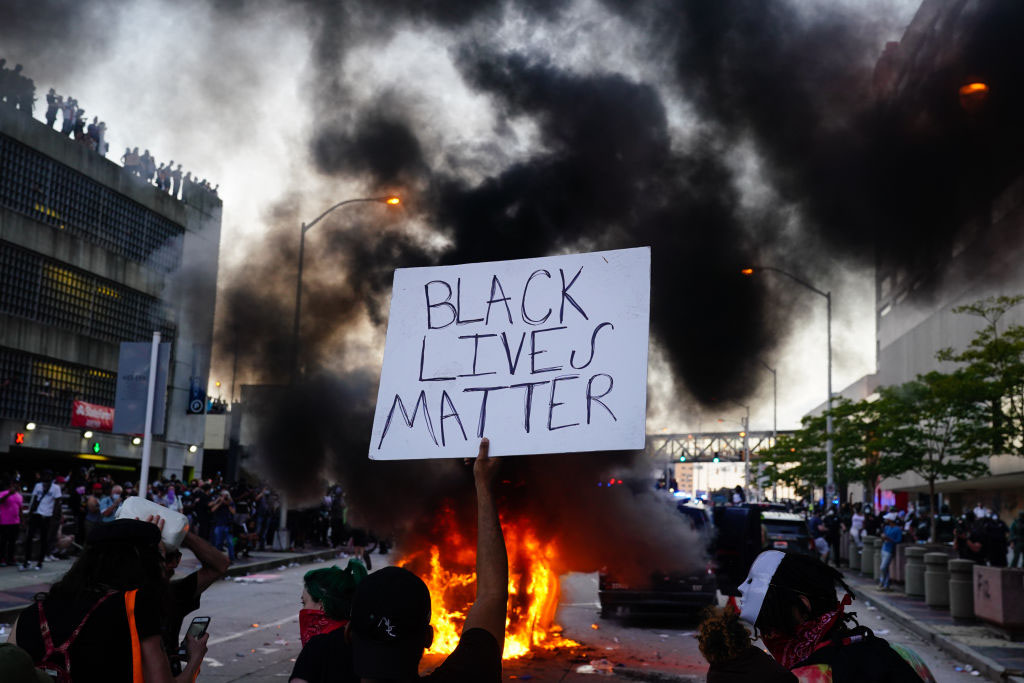One of the most consequential but least-covered stories of the year came out of a radio station in Sacramento last week.
Sportscaster Grant Napear, who was fired five years ago for tweeting “All Lives Matter,” is back at work, taking over the weekday afternoon slot on Fox Sports’ local station.
The man will make a living again.
Napear was canned by KHTK 1140 after 32 years with the station after tweeting “All Lives Matter…Every Single One!” in June 2020.
June 2020. Does that ring a bell?
That was the summer a few Orthodox Jews in New York City were harassed by the police for not wearing COVID masks while tens of thousands of unmasked Black Lives Matter protesters were allowed to march unprotected and in flagrant violation of social distancing rules.
Does that ring a bell?
After the death by asphyxiation of George Floyd at the hands of a white policeman in Minneapolis on May 25, 2020, the country lost its mind.
And Napear lost his job.
He had tweeted “ALL LIVES MATTER…EVERY SINGLE ONE!!!” in response to former Kings star DeMarcus Cousins, who asked Napear his thoughts on the Black Lives Matter movement.
In an interview at the time, Napear defended himself against the notion he was denouncing the black community and has racist views.
“It makes me feel sick to my stomach because it is absolutely the opposite of who I am,” he said to The New York Post. “I am 60 years old. I will let the track record of my life and what I’ve done for my community and what I’ve done. … People who know me, of all races, I’ll let them tell the story.”
I was thinking of writing a column at the time on the Jewish value of “all lives matter,” but a few friends dissuaded me, warning that I might be cancelled for being a “racist.” Would I also lose my synagogue membership, I wondered?
The summer of 2020 is when the era of “performing justice” reached its peak. Everything was about optics. Millions were poured into the Black Lives Matter movement from companies eager to show off their “anti-racist” virtues. BLM logos were flashed everywhere, from storefronts to company websites to front lawns, as many Americans wanted to show they were on the right side of history.
Black Lives Matter had permeated the cultural discourse, becoming a rallying cry at demonstrations around the world and posted all over sporting events. The movement became so credible and ubiquitous the mainstream media had to use kid gloves when covering the summer riots that resulted in more than $1 billion in property damage, 19 deaths and scores of cities imposing curfews.
So, you can imagine that a column about the Jewish value of “all lives matter” would have been a terrible optic.
Meanwhile, while these “optics of justice” were making all the noise, a different reality was slowly taking shape. Questions were being raised about how BLM was using donation funds. A co-founder resigned in 2021. Among other allegations, a report in 2022 from Sean Campbell of Columbia’s Journalism School detailed how BLM Global Network Foundation secretly bought a $6 million mansion in Southern California with donor money.
Most disheartening, perhaps, was the realization that while BLM was becoming a huge brand, it was largely neglecting the people it was supposed to help– the Black communities of the inner cities, who were suffering the most under reckless calls to “defund the police.”
The hard lesson many of us were learning is that showing off and making noise is not a substitute for the real work of rolling up your sleeves and making an impact.
The hard lesson many of us were learning is that showing off and making noise is not a substitute for the real work of rolling up your sleeves and making an impact.
The radio station that fired Grant Napear for expressing the sentiment that “all lives matter” was showing off. I guarantee you his firing did nothing to improve the lives of Black people in Sacramento.
Today, the ruthless cancel culture that led to Napear’s firing is cowering. If someone came after me for writing that “all lives matter,” I assure you I would call the police and take them to court.
I’m not alone.
A Pew study from June 2023 reported in its headline that “Support for the Black Lives Matter Movement Has Dropped Considerably From Its Peak in 2020,” adding that “A majority of Americans say the increased focus on issues of race in the past three years hasn’t led to improvements for Black Americans.”
This BLM setback doesn’t mean we should abandon the issues of race and racial injustice. It means we shouldn’t settle for the flashy optics that mark our social media era, and that it’ll take more than massive branding and clever rants on TikTok to make a real difference to people’s lives.
It’s quite conceivable that for certain people, saying “all lives matter” has a racial undertone. But to automatically assume that it does and call for someone’s firing is not justice, it’s censorious virtue signaling that does nothing to help Black people and undermines the foundational values of our country.
It also undermines the Jewish value which teaches that all lives really do matter, and more importantly, that it’s not just a slogan. Rather, it’s a principle we must apply regardless of religion, ethnicity or skin color—and that includes an unknown white radio announcer in Sacramento.




